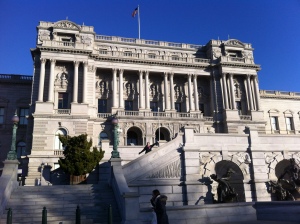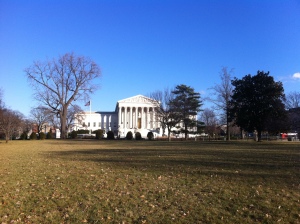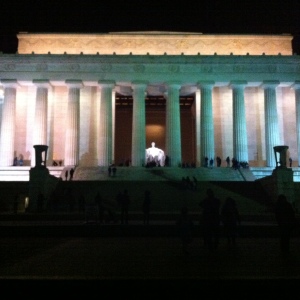Integrative Studies: An Introduction
As part of the Integrative Studies program here at Otterbein University, each student takes courses outside their selected major, following a particular model. Not everyone takes the same courses, and only one Integrative Studies course per semester, but these courses provide students the opportunity to explore other disciplines, gain perspective of the greater world of academia, and much, much more. The Integrative Studies program at Otterbein is one of the main reason I chose to attend the university. Always the curious learner, the idea of being able to dabble int other fields, without getting too advanced or complicated, was and still is a great idea! For more information about the Integrative Studies Program, check out the website HERE!! I have taken 8 of these courses in my time at Otterbein, and they have been some of the most interesting and intellectually stimulating of my collegiate career. Not that the Communications Department doesn’t rock my socks, because it totally does! (Hey, I have a major and two minors from that department, after all!)
Anyway, the reason I bore you with Otterbein graduation requirements is to tell you a bit about my DYAD experience. A dyad is made up of two courses that interrelate to create an academic experience. I chose the Community Leadership dyad made up of a Leadership Course, LEAD 3000 and a Community Service Course, INST 4045. This fall, I took the Leadership course with Dr. John Kengla and learned not only about developing my leadership style, but also how my values, goals and leadership opportunities helped develop me into a future leader. It was a great experience. To see my full leadership story, click HERE!! For J-Term, January Term, I took the second half of the dyad: A Civic Apprenticeship, Washington DC. January Term is an intensive three week time period where students have the opportunity to take one course and immerse themselves in the material. My class spent the first half of the term in the classroom talking about social justice issues, and the following half in Washington DC, mainly working in community service.
My Experience
Washington DC was exciting, exhilarating and exhausting. I’ve never been so exhausted in my life, and after walking 53 miles in 7 days, I’m not sure how I managed to make it to the van to catch a ride home. For the course, I was required to reflect on my experience. What started out as a four page paper turned into a seven page sermon about compassion for others. I’ve linked the entire essay HERE, and please note that I have blacked out the names of individuals I met, to protect their identities. But for those of you with short attention spans, here are a few paragraphs I hope you’ll enjoy.
The Civic Apprenticeship course this J-Term was one of the most exhausting courses I have ever taken at Otterbein, in all the best ways. Reflecting on our time spent together, I experienced a rollercoaster of emotion about what we were learning. In the classroom part of the course, we saw videos of some of the worst examples of what a society can be and the gross mistreatment of others. The genocide in Rwanda, the racism toward Australian Aborigines, and even the plight of the working poor affected by the broken system here in America, were all films that I’m not likely to forget. Even though we witnessed the despair of other human beings thorough the videos we saw and some of the articles we read, the text for the course, Soul of a Citizen by Robert Loeb, provided a new way to think about bringing about change and becoming active members of the solution to the problem instead of just passersby.
One of my favorite quotes from the book is in chapter six. “But we can also see it is a call for courage and wisdom—a challenge to choose our battles wisely as we continue to challenge injustice and to expand our definition of what we can change,” (143). Loeb is talking about carefully considering issues to tackle and bring about change. In our field experience in Washington DC, we saw and discussed so many issues in society today. We got up close and personal with homelessness, poverty, hunger, addiction, abuse, and neglect. It’s overwhelming to consider how many people are affected by these issues, and often in the stories I heard, one or more of these issues causes a domino effect into several others. Always an optimist, the stories I heard carried a common theme of having compassion for others. Some of the individuals I met were able to care for others, even when they were in the bleakest of situations.
And for your reading pleasure, my conclusion is below.
As I review Loeb’s ten suggestions at the end of Soul of a Citizen, I found four that really resonate with this course experience. The first is “Suggestion #1: Start where you are.” With our experience at HIPS, Helping Individual Prostitutes Survive, I was exposed to the idea of meeting people where they are and promoting health and safety instead of a larger issue such as drug use or prostitution. The next suggestion I enjoyed is “Suggestion #5: Enlist the uninvolved.” I’ve already discussed the importance and delicacy of raising awareness about issues and choosing a solution based on what works the best for the problem that needs solved. Suggestion #9 is to think large. I’m a proponent of dreaming big dreams and praying big prayers to help solve big problems. Homelessness is a big problem, and now that I know the extent of the issue, it will be hard not to imagine an end to the fact that is people have nowhere to go and no one to rely on. The final suggestion is “Suggestion #10: Listen to your heart.” I don’t think many social justice issues can be solved or even understood unless there is a significant tug on the hearts of those involved. Just as the issue I became aware of was the power of human compassion for others, I think the heart plays a major role in decision making and maybe even the solution to the problems in society today. All of the suggestions were taken from the book’s Postscript: The Ten Suggestions on pages 355-356.
As I conclude my reflection on The Civic Apprenticeship, the idea that resonates with me is that there are issues. Huge issues of huge importance that society has the means to solve. Also, there are people, average, ordinary, everyday people who are willing to put their hearts into their work to provide a well-meaning solution, no matter how temporary, to help resolve some of these issues. I was not prepared for how emotional this experience was going to be, but I think that’s all part of the experience. I still continue to struggle with how I fit into the puzzle and the apathy that our country seems to have over these issues. But I think I’m doing my best by taking a leap of faith in pursuing educational change through my Teach For America commitment and my commitment to nonprofit organizations in general. I also plan to share what I’ve learned. It is all about the stories. It really is.
I reference Robert Loeb’s The Soul of a Citizen in this essay, and I encourage everyone to pick this book up. Just do it. This experience threw me out of my comfort zone in almost every way imaginable, but reaffirmed my faith in people, in society, and in God. It was a life changing experience, that’s for sure.
Some Photos
Here are some photos from our one day of sight-seeing in Washington. I hope you recognize some of these famous American landmarks!!




![IMG_1242[1]](https://kathrynemcclain.wordpress.com/wp-content/uploads/2014/01/img_12421.jpg?w=300&h=224)


Leave a comment